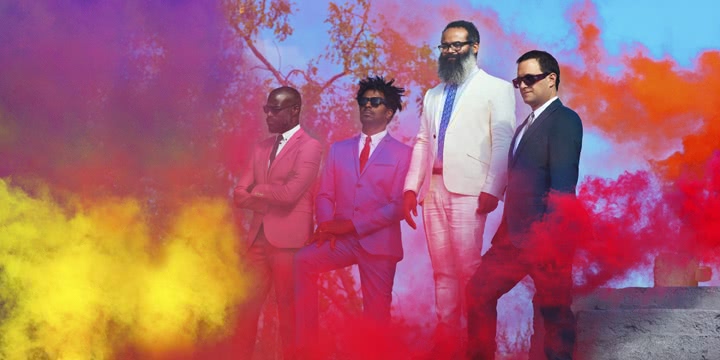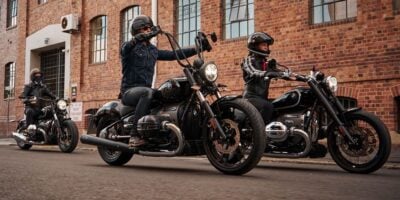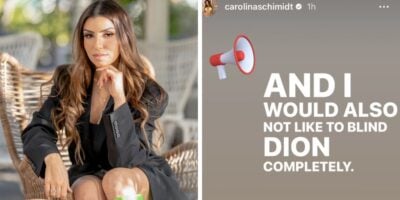The operator tells us she is sorry to interrupt the conversation, but we’re out of time. That may be so, but I doubt her sincerity; her voice is far too friendly for remorse. Tunde Adebimpe isn’t having a bar of it either, and so the interview with the TV On The Radio frontman wheels on for another 30 minutes, spanning his not-quite-prodigious childhood, the heroes that still inspire him, through to long-forgotten songs in long-sealed cardboard boxes. The ridiculously talented indie rock quartet is returning to Sydney for Vivid LIVE, which is rather apt; a city full of shifting colours and surreal sights seems an ideal fit.
“I might not have been a prodigy,” Adebimpe laughs, thinking back to his early days growing up in Hampton near Pittsburgh. “But I’ve been told that I was imaginative, almost to a fault. If anything seemed in the tiniest bit boring, then it just wasn’t going to happen. I actually spent a lot of time not talking. I could just sit there and draw all day. I remember as soon as I realised I could disappear that way, it was all I wanted to do. To this day I’m still a compulsive doodler, I’m always drawing. But it always seemed like the best way to make sense of the world was to imagine it was otherwise.” He chuckles under his breath. “I think it might have been J.G. Ballard who said that reality was neither sufficient nor real. I definitely agree with that – it’s something that has been true across a lot of my life.”
Stumbling across something that forever alters your perception of the world is, arguably, one of the key distinctions between the experience of great art and everyday entertainment (though both are of equal importance). The English novelist Ballard’s work is one such instance; to read him is to challenge the world through stranger eyes. Adebimpe’s influences are many and varied, and discussing them turns out to take some time. He is a man who does not hurry his responses, and has no qualms in letting silence swell while he assembles his thoughts.
“There really are a lot. It’s hard. James Baldwin is a strong influence. As far as thinking of influences who are like, ‘You can do this, you can find a space for yourself by creating the things that you want to see in the world, the things you want to hear,’ a lot of who you hear as a teenager is going to be important. For me it was a lot of punk rock. Bad Brains, Minor Threat. Bands that made me realise you don’t have to be quote unquote ‘cool’, and in fact it’s probably going to turn out to be a huge asset if you’re not. You just have to make the things you need to make.
“But you’re influenced differently now. Most of my favourite bands, I knew nothing about them while I was growing up. And I mean, nothing. But even the interviews I did see as a teenager didn’t really give much insight into anything other than they were sitting in a cafО and talking about a lot of things that didn’t have much to do with music.”
While the demand for information has always existed, the digital age has certainly exaggerated the appetite for greater and greater insights into a band. We are an audience so bombarded with added content and celebrity secrets that scrutiny of an artist’s private life is now de rigueur, even at the expense of losing that sense of mystery and intimacy that can make music so essential in the first place.
“That ruins it for me,” says Adebimpe. “You need space to have interpretation. You need to leave a space for someone to enter the music and make their own meaning without being told, ‘OK, to listen to this song you first need to put on this jacket and these pants and have this haircut. We’re going to keep you in this very comfortable state of telling you exactly what I want you to know.’
“The stuff I like the best are the songs that have a strong structure, but there’s a lot of room for me to interpret things in my own way. I remember some musician talking a long while ago about music videos and how they were a kind of evil visual. They made the song attached to one image; people would remember the video before they would remember the song. I still feel slightly the same with interviews. It’s nice to find out a little about someone, but in the context of the work or where it came from … I don’t really like to know.”
Adebimpe has recently packed up and shifted coastlines from New York to LA. Given he has called NYC home for 22 years, it’s no stretch to suppose the city has played a vital role in TV On The Radio’s development, and it’s likely we can anticipate LA having a similar effect. One of the procrastinating upsides of moving, of course, is the chance to pore over old memories stuffed away in forgotten corners, and for Adebimpe it was no different.
“I opened one box and here are all these four-tracks. I ended up finding demos for TV On The Radio songs that sound so different from the way they ended up, all these songs I’d written and completely forgotten about. In one way it feels like, it’s strange to go back and not recognise that person, but in another way it’s also really nice in some fashion to be able to see a lot of the steps that brought you where you are now. And on some level, also you realise that in another ten years you’re not going to know anything about this person here today at all, either.”
It leads us, somewhat inevitably, to talk of legacy; how Adebimpe’s past self has shaped the man he is today, and what kind of memory of him might be assembled from the work once he has gone. “I’ve left instructions with certain friends to burn everything,” he deadpans, then laughs. “It’s definitely not going to matter to me what’s left. I think you’re going to leave behind what you leave behind, and hopefully you’ve left something which is useful to something else. But the planet is going to fly into the sun someday, anyhow. I mean…”
He trails off again – for so long I almost fear the operator has made good on her promise and cut us off after all.
“If you can keep going,” he suddenly continues, “if you can keep going with a creative endeavour, it’s one of the most terrifying things, because you can pick up a thing that you did a long time ago, and just stare at it … I mean terrifying because sometimes you’re embarrassed by it, but it can also be terrifying because you don’t recognise it at all. You like it, but you don’t know it. You see your handwriting, you hear your voice, but you have no idea who that person was. Not remembering them at all. But I think that can be a great feeling. You’re making a time capsule for your future self.”
Seeds is out now through Harvest/EMI. TV On The Radio play theConcert Hall, Sydney Opera House,Monday June 8 and Tuesday June 9, as part of Vivid LIVE 2015.



































